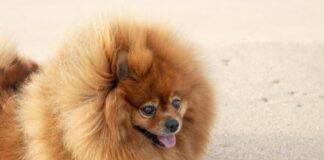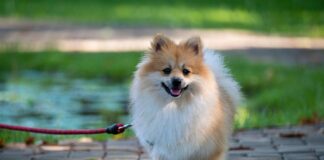When your darling has reached about two-thirds of their life expectancy, things change: they enter the senior phase of their existence. Every dog ages in its own way, the body and the senses, similar to us humans, slowly decline. The attentive owner notices the changes in the skin and coat and is surprised that the dog is shaking, no longer eating, breathing difficultly, or smelling unpleasant. In this article, we deal with the most common changes in old age.
How does the entry into the “best years” show up? Sometimes we don’t even realize it properly at first, which is probably due to the fact that our four-legged friend is by our side day and night. The changes begin gradually and do not even have to be serious or cause the dog to feel uncomfortable. Unlike humans, dogs deal with their aging process more naturally; they just seem proud to have seen the time. And you should be first and foremost, even if a phase occurs that may require more care, patience, and love from you.
The most important signs at a glance:
The dog’s skin and coat change

Your darling gets gray hair around the nose and eyes. Dog skin often becomes thicker and darker with age. The skin of the aging four-legged friend loses its elasticity. With advancing age, the pigments in dog hair decrease, the hair turns white, the skin can become dry and the coat loses its sheen. The regenerative capacity of the hair cells deteriorates and hair loss can be the result. Often whole “patches” of hair fall out, you can see bald spots in the fur.
He seeks rest, sleep, and warmth
The old dog is getting calmer. Old dogs need more sleep, and warm places in the sun or in front of the radiator are preferred. A blanket to cover is also felt to be comfortable while sleeping.
Changes in behavior
Older animals can become “stubborn”, they insist on their usual daily routine. If something changes, they can react with less adaptability, fearfulness, and irritability. Or the formerly spirited greeting of family members can turn into relaxed behavior. Do not be disappointed because your senior only saves a little bit of energy in his old age, because the majority of senior dogs tend to be particularly clingy when they get older. Some specimens prefer the quiet life, withdraw and especially avoid contact with the “young wild ones”.
Forgetfulness: do we know each other?

As in humans, the memory performance of pets declines with age. As a result, your dog may suddenly look at people he knew only briefly or no longer greet them at all. Maybe he’s suddenly sniffing the whole apartment for his favorite toy, which he was just playing with. Unfortunately, pets can also develop serious dementia. If your dog suddenly gets lost on the usual route while walking, is no longer familiar with the house of good friends or no longer recognizes close caregivers, you should have this possibility in the back of your mind and have it clarified. Because then your darling needs very special care.
The dog hears, sees, and smells worse
Your animal companion suddenly rumbles against furniture, sits helplessly in front of his bowl, or “hears” even worse than before? Maybe this is simply due to Bello’s deteriorating sense of sight, smell, or hearing. Similar to humans, the sense organs degenerate as they get older. This does not have to cause any major problems, because your four-legged friend knows the years of communication by voice or hand signals as well as the usual daily routines. Perhaps it just takes a little more patience and, depending on the situation, a little more clarity. Incidentally, the decreasing number of olfactory cells can impair feed intake and manifest itself in a loss of appetite, which you should not compensate for with artificial flavors, but with particularly tasty dishes.
Dog is getting thicker or thinner
Weight can tend in both directions with age. The reason for the increase is usually the lower desire to move with constant feeding. In addition, the ratio of muscle to fat tissue changes. The proportion of muscle mass decreases, the proportion of fat tissue increases. On the one hand, significant weight loss can be due to muscle loss, but it can also be an indication of a deterioration in health, which not only depends on age but is triggered, for example, by tumors. The altered metabolism and degeneration of the digestive tract can show up in constipation, diarrhea, or stomach problems. At this point, at the latest, a clarification and, if necessary, a switch to senior feed is announced.
Problems with teeth and bad breath
The loss of minerals in the teeth and tartar can cause the loss of teeth, which can manifest in the form of unpleasant bad breath, pain, loss of appetite, or avoidance of crunchy food. Have the dog’s teeth checked regularly as a prophylactic measure in order to take appropriate measures at an early stage and to maintain dental health for as long as possible?
Kidney and bladder problems
He never did that before: suddenly you find small puddles here and there? Please don’t rant, just go out a little more often. Because the kidney is often the first organ to deteriorate in its function. In interaction with the bladder, this can manifest itself in bladder weakness or incontinence and/or in males due to the change in the prostate, it can lead to difficulties in urinating.
Weaker muscles and bones

Muscles, bones, and cartilage regress with age. If there is not enough cartilage left, the bones rub against each other, which is painful for the dog. In addition, the pads of the paws and claws change. The pads thicken and the claws become more brittle. Make sure that your dog gets enough exercise as it ages. Feeding appropriate additives such as collagen powder can make sense here.
The changes listed are not a cause for concern at first, they should rather encourage you to adjust to the new phase of your pet’s life and make sensible changes so that your dog remains happy and healthy. The most important measure, as soon as you observe the first signs of your four-legged friend entering the “retirement age”, is to switch to age-appropriate food and, if necessary, to add food supplements. In this way, it is possible to have an extremely lasting influence on health. In this way, one can take care of maintaining the ideal weight, keep coat and skin “in good shape”, support the immune system, the kidney function as well as joints and teeth. Give your darling a little more breaks and still plenty of exercises as well as at least two doctor’s visits a year to be on the safe side.
Please never forget: Your senior dog depends on you being active right now and looking for health changes despite all creeping habits. Apart from the normal processes, they could make life uncomfortable or even life-threatening for your animal roommate. When something is wrong, sometimes every minute counts!





























